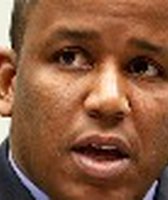Stand up for the facts!
Our only agenda is to publish the truth so you can be an informed participant in democracy.
We need your help.
I would like to contribute
Chiles needs schooling on education rankings
Bud Chiles has long been critical of Florida's public education system. He has bashed the Florida Legislature for directing insufficient dollars toward Florida schools and, most recently, launched the "Worst to First" initiative, a statewide effort publicizing Florida's low ranking in a variety of categories concerning children.
It came as no surprise, then, when he made education a cornerstone of his independent gubernatorial campaign.
"Too many of our children are failing in schools because Florida is failing our children... Today, Florida is in 50th place in spending on education," reads his campaign website.
Florida's education reputation has never been stellar, but Chiles' dead-last claim seemed worth verifying.
His campaign offered this clarification, "Florida is currently ranked 50th out of 50 states in per capita funding for K-12 public education and 39th in per-pupil funding." They directed us toward the U.S. Census Bureau's public education finance report and Education Week's "Quality Counts 2009," two respected rankings of the nation's public schools.
What we found raised more questions than cafeteria mystery meat.
The Education Week source earned Chiles a big "F", for false. It placed Florida 31st in its national ranking of school finance in its January 2010 report, not 50th. The rankings consider equitable distribution of school dollars and regional cost differences. Its results were based on 2007 spending levels. The report showed Florida was improving from previous years, when the state ranked 39th in 2009 and 38th in 2008.
Education Week also ranked the states on simple per-student spending. In its 2010 report, Florida ranked 38th on that list. It was 41st in 2009, and 39th in 2008.
"I’ve looked at the past three years reports, but Florida wasn’t ranked last in any of the school finance indicators during the period," said Hajime Mitani, a research analyst for the EPE Research Center, which conducts research for Education Week's annual rankings.
But the Chiles campaign had done its homework when it came to the Census report.
In per-pupil spending, Florida was below the national average in 39th place, according to the Census' most recent findings from June 2010, which looked at 2007-2008 spending. But when the Census looked at what states spent per every $1,000 of personal income, Florida dropped to 50th.
In fact, Florida came in 50th in that same category in every report from 2010 through 2007. The state wasn't dead-last, however. The Census report includes Washington, D.C., in its ranking, so every time Florida finished 50th, it placed before the nation's capital.
Still, Florida never ranked below 40th place in overall per-pupil spending during those years.
We went back to the Chiles campaign, which then sent us toward the National Education Association, a teachers union.
The union's December 2009 report ranked Florida 50th in per-capita state education expenses during the 2006-2007 school year. It also ranked Florida 50th in total state government education spending for every $1,000 of personal income during the 2006-2007 school year.
But, as with the Census report, the report's findings weren't conclusive.
Although the Chiles campaign highlighted the findings having to do exclusively with state spending, the union's report also determined:
- Florida ranked 41st in per-student spending based on K-12 fall enrollment during the 2008-2009 school year.
- Florida ranked 47th in per-capita state and local government education spending during the 2006-2007 school year.
- Florida ranked 6th in per-capita state and local government K-12 school capital spending during the 2006-2007 school year.
Finally, the union's report offered this caveat: "Of course, no set of tables tells the entire story of a state’s education offerings. Consideration of factors such as a state’s tax system, provisions for other public services, and population characteristics also are needed. Therefore, it is unwise to draw conclusions based solely on individual statistics in this report."
That Chiles directed us toward three education reports that didn't fully support his claim is also telling: Depending on how the numbers are massaged, Florida's spending record can vary widely.
"If you are comparing states, everything is relative," said Jack Jennings, president of the Center on Education Policy in Washington, D.C. "Like with anything, your outcome depends on how you define the process. So you can use different factors and come out with different results."
Other education experts cautioned against putting too much faith in the various rankings, which often compare distinct state education budgets. For example, one state might include construction costs toward its total education dollars, but Florida does not. Critics also warn that demographic and geographic differences render the rankings moot.
"Unless everybody is doing the same thing, it is not really fair," said Cheryl Etters, a Florida Department of Education spokesman.
Consider that the National Center for Education Statistics, another highly regarded education group, determined Florida spent $9,084 per pupil during the 2007-2008 school year in its most recent May 2010 report. New Jersey spent the most, at $17,620. Utah spent the least, at $5,978. Using these numbers, Florida would place 35th in spending.
But the center did not rank the states according to these findings. Instead, states were listed in alphabetical order.
"We never rank. We list it alpha. In many ways, it’s not really fair to compare Florida to Nebraska," said Tracy Dell'Angela, communications director for the Institute of Education Sciences, which oversees the National Center for Education Statistics.
Chiles himself questioned the authenticity of such rankings when Education Week placed Florida 10th in overall quality of education in 2009.
"It's bunk, it's just wrong to say that we're 10th in education or to say we're progressing nationally," Chiles told the Miami Herald in August 2009. "It's just clearly not true."
Now, let's revisit what Chiles said on his campaign website: "Today, Florida is in 50th place in spending on education."
We think that statement deserves red marks on several grounds. His campaign cited two outdated reports. The Census data's most recent report was based on 2007-2008 school year spending. The union's ranking was from the previous school year. That doesn't count as "today" in our book. What's more, these reports and various others put Florida's spending record all over the map.
It is true that the Florida Legislature has not made any gains in public school spending in recent years because of the stalled economy. This year, overall per-student funding increased from $6,842.29 to $6,843.51, or $1.22 per student, but the state got there by asking local governments to contribute more. There's no way to know whether that's enough to change any of these rankings, no matter which measurement is used.
So no gold star here. We give this a Half True.
Our Sources
Bud Chiles campaign website, education page, July 6, 2010.
Telephone interview, Cheryl Etters, Florida Department of Education spokesman, July 6, 2010.
Orlando Sentinel, "Florida rises in schools report, but some rankings use old data," January 14, 2010.
St. Petersburg Times, "For better schools," November 22, 2009.
Miami Herald, "Florida's education rankings difficult to fathom," August 12, 2009.
St. Petersburg Times, "Florida schools rank No. 10, higher than national average," January 7, 2009.
Education Week, School Finance report, January 14, 2010.
Email interview, Hajime Mitani, research analyst for EPE Research Center, July 6, 2010.
National Center for Education Statistics, "Revenues and Expenditures for Public Elementary and
Secondary School Districts: School Year 2007–08 (Fiscal Year 2008)" May 2010.
Email interview, Jim McClellan, Bud Chiles campaign spokesman, July 6, 2010.
U.S. Census Bureau, "Public Education Finances 2008," June 2010.
U.S. Census Bureau, "Public Education Finances 2007," July 2009.
U.S. Census Bureau, "Public Education Finances 2006," April 2008.
U.S. Census Bureau, "Public Education Finances 2005," April 2007.
St. Petersburg Times, "Florida No. 35 in per-pupil spending," May 20, 2010.
Email interview, John C. Hall, executive director of the Florida Center for Fiscal and Economic Policy, July 7, 2010.
Email interview, Tracy Dell'Angela, communications director, Institute of Education Sciences, July 6, 2010.
Telephone interview, Jack Jennings, president of the Center on Education Policy, July 7, 2010.
National Education Association, "Rankings and Estimates," December 2009.
Email interview, Cynthia Kain, National Education Association spokesman, July 7, 2010.
Florida budget, public school funding, April 2010.
St. Petersburg Times, "Florida schools to see flat funding ... if the stars align," April 27, 2010.
St. Petersburg Times, "It's official: $1.22 more per student in Florida," May 28, 2010.
Telephone interview, Stephen Wheeler, US Census Bureau survey statistician, July 7, 2010.
Browse the Truth-O-Meter
More by Cristina Silva
Chiles needs schooling on education rankings
Support independent fact-checking.
Become a member!
In a world of wild talk and fake news, help us stand up for the facts.





















































